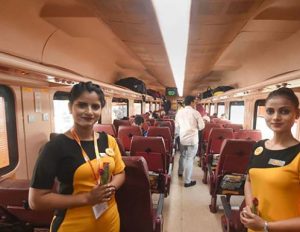 On October 16, 2019, Piyush Goyal, the Union Railways Minister tweeted from his official handle about Railways gift to Maa Vaishno Devi’s worshippers by launching Vande Bharat Express from Delhi to Katra. This was a clear indicator that Railways was working overtime to improve services and be more people-friendly.
On October 16, 2019, Piyush Goyal, the Union Railways Minister tweeted from his official handle about Railways gift to Maa Vaishno Devi’s worshippers by launching Vande Bharat Express from Delhi to Katra. This was a clear indicator that Railways was working overtime to improve services and be more people-friendly.
It may be recalled that Bibek Debroy, an economist, author and bureaucrat led a committee that suggested that the entry of new operators into railway operations would give a fillip to growth and improve Indian Railway services. Now the government has formed an empowered group to prepare a feasibility plan for upgrading 50 railway stations to world-class standards and allowing private players to operate 150 trains.
This comes on the heels of the privatisation of six airports in the country. The NITI Aayog, a policy think tank of the Government, established with the aim to achieve sustainable development goals, is pushing for a comprehensive plan that envisages a holistic development of the area around railway stations, which has strong potential to draw private investment.
Inquiries reveal that the cost of holistic development of railway stations in metro cities in India is pegged at about 10,000 crores, while that in tier-2 cities could be between 3,000 crores and 4,000 crores. The Indian Railways’ plan to develop 400 railway stations has made little progress and the national transporter has drawn flak from Niti, given the plan is moving at a glacial pace.
Niti Aayog CEO Amitabh Kant in a recent letter addressed to Railway Board Chairman VK Yadav said that there is a ‘necessity’ to take up the matter of developing at least 50 stations on a priority basis. The letter quoted him saying that “Considering the recent experience in the privatisation of six airports, a similar process for setting up an Empowered Group of Secretaries to drive the process is required.”
The Niti Aayog wants these projects should be taken up on a Build-Operate-Transfer basis so that there is no financial burden on the public sector alone.
The development follows the flag-off of India’s ‘first private semi-high speed train’, the Lucknow-New Delhi Tejas Express. Tejas, run by the Indian Railway Catering and Tourism Corporation (IRCTC), offers facilities for rail passengers that were virtually unheard of earlier in the country — 25-lakh travel insurance, luggage pick-up and drop, and monetary compensation in case of delays.
In fact, the Indian Railways has launched itself on the road to privatization by flagging off the Tejas Express running between Lucknow and Delhi and announcing plans to privatize the running of as many as 150 passenger trains. The Tejas Express will be run by IRCTC, a subsidiary of the Railways. So there is not much real privatization there, to begin with. IRCTC cannot have been expected to drive a hard bargain for itself, but that will happen when full-fledged private firms bid for various tasks.
Railway unions are opposing the move to open the floodgates for private participation. They fear that lakhs of employees will become jobless or no longer have job security. The best way the government can allay these apprehensions is to establish the long-overdue railway regulatory authority. It is worth mentioning here Debroy Committee was not the only one to suggest an independent regulator that can promote healthy competition and protect the interests of various stakeholders, but also by the Rakesh Mohan Committee in 2001 had suggested on the same lines.
Another good that the Railways is doing is that it is going in for renewable energy usage in a big way in the near future. In India, the social importance of the Railways will grow with climate change concerns, leading to greater use of public transport. The Railways has taken the positive step of shifting to renewable energy over time, and so is a public good whose use goes beyond paying its keep.
On the other hand, private ownership tends to improve services and cut costs, particularly under conditions of competition. When the public suffers due to the perceived laid-back attitude of a state-owned enterprise, support for privatization grows. For instance, besides concerns like cleanliness, catering, and mishaps, the railways have to ensure ensuring competition within a public utility needs complex regulation that has to offer a level playing field to all players sharing a common infrastructure.
The railways have asked its different zones to identify potentially-viable and operationally-feasible routes for the introduction of privately-operated passenger trains. In a letter dated September 23, the Railway Board has given an indicative list to all the zones, enumerating 24 routes that have the potential of being operated by private players.
The indicative list identified by the Railway Board for private train operation includes intercity, long-distance, and suburban routes. The railways have asked the zones to identify the routes when a meeting will be held with the Member Traffic on the issue. In the note, the Railway Board has said that private operators would be identified through a participative bid process to run private passenger day and overnight trains that would connect important cities.
Railway Board Chairman VK Yadav said the national transporter will offer more trains to private players in the coming years. He said on private basis, the first Tejas Express train operated by the Indian Railway Catering and Tourism Corporation (IRCTC) will start running between Delhi-Lucknow from October this year.
Interacting with reporters, Yadav said, “We are going to work on the speed enhancement of the Delhi-Mumbai and Delhi-Howrah corridor to 160 kmph in the next four years. The Eastern and Western Dedicated Freight Corridor will be completed by 2021 which will have a speed of 100 kmph. Once these dedicated freight and passenger corridors are operational, we can introduce more trains to private players.”
He said allowing trains to private players is important for the Railways to sustain and grow. However, the maintenance of the train coaches, locomotives will be done by the Railways. Railways will provide its own crew of loco pilots and guards to run those trains, and the private players will have the remaining of the services such as ticketing, entertainment, and other services on board the trains. He said the privatization plan will take time. “We have started working on the plan and many companies have shown interest in the idea.” “We have already given two Tejas Express trains to IRCTC,” he said. “The first train to run on a private basis will be Tejas Express between Delhi-Lucknow and it will start running from October this year.”
Many companies are supportive of Railways’ idea of providing pick-and-drop taxi facility for the train passengers, carrying the baggage of the passengers, more entertainment system on board the train, good food and hotel, and taxi bookings, he said.
The Railway Board Chairman also stressed the need for the corporatisation of Indian Railways manufacturing units. “Though no decision has been taken yet, we are talking to all stakeholders. We are preparing ourselves and also preparing the report on how to maximise the income of the Railways,” he said. Giving the example of China on corporatization, he said, “The Chinese corporatized their railway’s manufacturing units and then they started exporting their trains to over 100 countries.”
letters@tehelka.com












